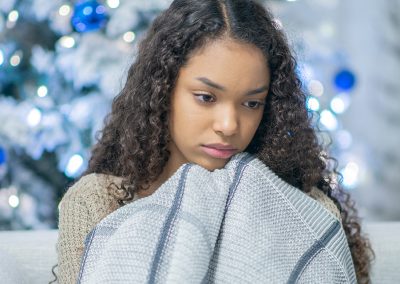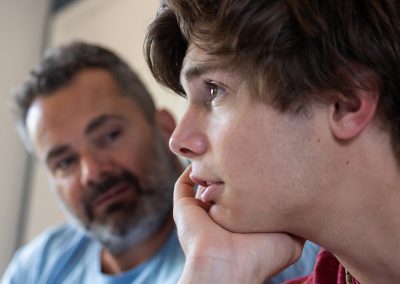We all know how it feels to face the morning when we haven’t gotten enough sleep. Lack of sleep can make us grumpy, unable to focus, and more negative about life in general. Sleep-deprived teens experience these symptoms every day.
Sometimes it can be hard to sort out the reasons for a teen’s moodiness. But no matter what’s going on, too little sleep is likely to make it worse. In fact, research shows that sleep problems increase the risk of teen suicidal behavior. To help adolescents avoid the risks that come with sleep deprivation in teens, it’s important to understand the signs, the causes, and how to help.
Recognizing Sleep Deprivation in Teens
Here are a few common signs to watch for that might indicate that your teen is not getting enough sleep.
- Having trouble waking up most mornings
- Irritability and mood swings
- Falling asleep easily during the day
- Trouble concentrating or poor academic performance
- Sleeping very late on weekends
- Hyperactivity and nervousness
- Aggressive behavior
Moreover, the stages of sleep deprivation include acute sleep deprivation, including the symptoms above, and chronic sleep deprivation, which can lead to serious physical and mental health problems.
Causes of Sleep Deprivation in Teens
How many hours of sleep do teens need? For most adolescents, nine hours of sleep is ideal, but very few of them are actually managing that. One study conducted by the Centers for Disease Control showed that less than 9 percent of teens get enough. Here are some of the causes of teen sleep deprivation.
Why do teens need more sleep? Their bodies and brains are still developing, and sleep provides an essential revitalization of all the bodily systems.
- Technology that affects teen sleep, such as social media, Internet use, video games, and television
- After-school activities that push study times later
- Heavy homework loads
- Schools with early start times
- Using caffeine or nicotine
- “Sleep phase delay”—teens’ natural biological clocks keep them up later
- Stress
- Light exposure from screens that cues the brain to stay awake.
“Almost all teenagers, as they reach puberty, become walking zombies because they are getting far too little sleep.”
—Cornell University psychologist James B. Maas, PhD, leading sleep expert

Teenage Sleep Deprivation Statistics and Mental Health
A study of close to 5,000 teens found that depression and anxiety symptoms were closely linked with sleep deprivation in teens: Teenagers with depression symptoms got 3.5 hours less sleep on average than the control group. Moreover, sleep deprivation at age 15 increased the likelihood of mental health problems in the ensuing years.
“This longitudinal study confirms what we see clinically—that poor sleep during adolescence can be a ‘fork in the road,’ where a teen’s mental health can deteriorate if not treated,” said study co-author Michael Gradisar.
Sleep Disorders and Suicidal Thoughts
Furthermore, sleep problems can increase the risk of suicide for young people. A 2023 study found that adolescent sleep disorders are associated with a greater chance of having suicidal thoughts.
Researchers found that youth with at least one sleep disorder were three times more likely to go to the ER for suicidal ideation. If they had both a sleep disorder and a mood disorder, the risk of suicidal ideation was 46 percent higher than for teens without those conditions.
Effects of Sleep Deprivation on the Teenage Brain
Lack of rest has a negative impact on the functioning of the emotional regulation circuit of the brain. In studies conducted by Matthew T. Feldner, a professor of psychology at the University of Arkansas, people who lost a night of sleep responded with more emotion to stressors presented in the lab.
One study examined how teenagers reacted during the day when they hadn’t gotten enough sleep. Sleep-deprived teens found stressful situations much more threatening than the more mature study participants.
Furthermore, researchers have found that sleep-deprived teens feel more depressed and anxious. In a study of nearly 28,000 high school students, each hour of lost rest was associated with a 38 percent increase in the risk of feeling sad or hopeless, and a 58 percent increase in suicide attempts. Another study found that high school seniors were three times more likely to have depression symptoms if they had excessive daytime sleepiness.
Sleep-Deprived Teens, Substance Abuse, and Risky Behavior
Another reason why sleep is important for teens is because sleep deprivation can increase their likelihood of using drugs and alcohol. A study published in the Journal of Youth and Adolescence indicates that the disruption of the natural sleep cycle can significantly increase the risk of substance use, by interfering with brain functions that regulate the experience of reward, emotions, and impulsivity.
Sleep-deprived teens tend to engage in risky behaviors because their impulse control is compromised. The National Center on Addiction and Substance Abuse statistics show that high school students who get less than eight hours of sleep per night are significantly more likely to use alcohol, smoke marijuana, and become lifetime users of illegal drugs. One study found that sleep deprivation is linked to binge drinking, drunk driving, and unprotected sex.

Sleep Hygiene for Teens: 7 Tips
Here are some ways for sleep-deprived teens to sleep better and longer.
- Do physical activity during the day.
- Make time for short naps.
- Set an electronic curfew when all devices go off.
- Create a bedtime routine that includes relaxing activities, such as writing in a journal or listening to music.
- Keep the bedroom dark and cool.
- Avoid late-night snacks, which raise and then crash blood sugar, making teens wakeful.
- Practice yoga and meditation, proven to relax the nervous system.
In summary, a good night’s sleep will help sleep-deprived teens feel better in mind, body, and spirit.
Sources
Sleep Health. 2023 Jun; doi: 10.1016.
J Child Psychol Psychiat. 2020 Oct; 61(10):1126–1137.
J Youth Adolesc. 2015 Feb;44(2):362–78.
Alcohol Clin Exp Res. 2015 Feb;39(2):355–62.




